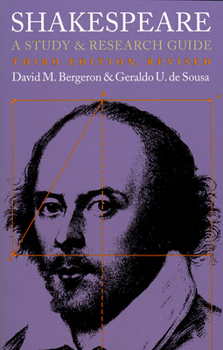Shakespeare: A Study and Research Guide?third Edition, Revised
Select Format
Select Condition 
Book Overview
Confronted with the formidable and at times daunting mass of materials on Shakespeare, where does the beginning student--or even a seasoned one--turn for guidance? Answering that question remains the central aim of this new edition of a guide that has been a much admired mainstay of Shakespeare studies for two decades. Thoroughly revised and updated, this widely used teaching and study tool adds concise analyses of more than 100 new books on Shakespeare published since the 1987 edition. It also greatly expands the section on the history plays and provides separate new categories for film and television and for culture studies focusing upon seasonal festivities, hospitality, courtship rituals, sexuality, and other Renaissance social practices. Like its predecessors, the third edition continues to provide a thoughtful overview of the development and present state of Shakespeare scholarship and its extraordinarily diverse critical approaches--including sections on feminism and gender studies, Shakespeare's Romances, poststructuralism, and the new historicism--as well as summaries and evaluations of scores of bibliographies, periodicals, monographs, and reference books. For beginning and advanced students alike, the guide offers practical advice for doing research and writing critical papers on Shakespeare--including how to select and develop topics, prepare a working bibliography and outline, take notes, avoid plagiarism, and use appropriate documentation following the MLA system. Students will find especially instructive the new model research paper, which provides an easy-to-understand example.
Format:Paperback
Language:English
ISBN:0700606939
ISBN13:9780700606931
Release Date:March 1995
Publisher:University Press of Kansas
Length:248 Pages
Weight:0.44 lbs.
Dimensions:0.6" x 5.5" x 8.5"
Customer Reviews
1 rating
An outstanding guide
Published by Thriftbooks.com User , 23 years ago
"A classic in the field; in fact, it has the field to itself. Every scholar in Shakespeare studies knows about this volume."--William Carroll, author of *The Metamorphoses of Shakespearean Comedy*I am certain that this book does indeed have the field to itself; and the assertion that every scholar in Shakespeare studies knows about this volume is probably no exaggeration either. This is a truly excellent publication, and it can safely be said that every serious scholar in Shakespeare studies SHOULD know it. The book has a final section on the writing of a research paper which is very sound and helpful, but the bulk of the material is, quite rightly, concerned with the task of guiding anyone who wants to get a good idea of what kind of thing has already been said about Shakespeare by scholars who, whether "right" or "wrong", have made a substantial contribution in their work on the author. Obviously there is a real difficulty deciding what should be included in a book of this nature, but the selection has been wisely made. Very sensibly, there is no over-emphasis on what is recent. Thus S.T. Coleridge, for example, who remains one of the most important of the early commentators, is included, but so is e.g. Stephen Greenblatt, who is among the best-known modern ones. It is striking, too, how objective, accurate, and clear the authors are in their descriptions of what scholars have to say. This is no mean feat, since they are dealing with a very wide range of material, and include authors whom many would not be nearly so objective and factual about. As for the fact that the book is now a few years old: that is no reason for not buying it. After all, the few years NOT covered are only a very short span in the wider scheme of things, and it is certainly possible to find out about more recent publications by consulting e.g. reviews in *Shakespeare Quarterly*. At the least, this guide will direct one to the more important publications until the time of publication, and it is possible to decide from the descriptions supplied whether or not an item discussed here is likely to supply one's need. The book thus saves one a good deal of time as well as informing one about major statements and trends in Shakespeare scholarship; it is an essential tool for anyone doing serious work on the author - certainly if not a beginner, though even a beginner willl find the book accessible and informative enough to be of use. - Joost Daalder, Professor of English, Flinders University (South Australia)





